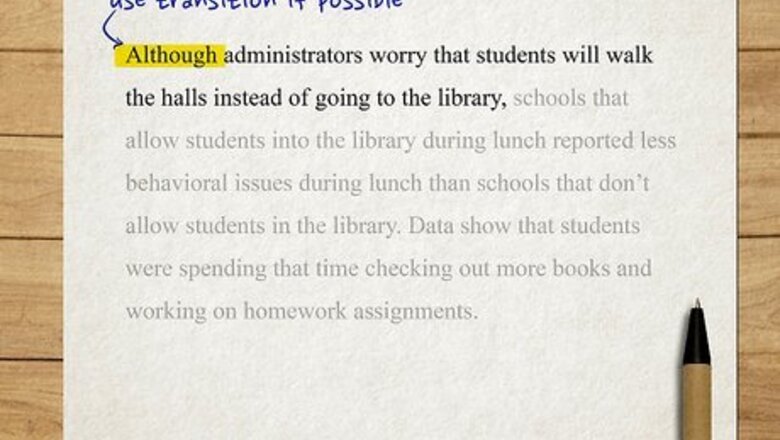
views
- Rephrase your thesis to include in your final paragraph to bring the essay full circle.
- End your essay with a call to action, warning, or image to make your argument meaningful.
- Keep your conclusion concise and to the point, so you don’t lose a reader’s attention.
- Do your best to avoid adding new information to your conclusion and only emphasize points you’ve already made in your essay.
Writing a Strong Conclusion

Start with a small transition. This isn’t necessary, but it can help your essay flow seamlessly and cue the ending of your argument. Read the last sentence of the previous paragraph. What naturally comes to mind as a following sentence? Try using one of these transitional phrases: “All in all” “Ultimately” “Furthermore” “As a consequence” “As a result” “In brief”

Briefly summarize your essay’s main points. Rewrite the topic sentences of your body paragraphs in 2 or 3 sentences. Basically, list the main points of your essay and restate why they’re important. This will help reinforce your argument and remind readers what the entirety of your essay is about. Make sure to write your main points in a new and unique way to avoid repetition.

Rework your thesis statement into the conclusion. Your thesis statement is the main point of your essay, so making sure it’s concluding at the end is very important. Go back to your introduction and pull out your thesis statement. Then, rephrase it for your conclusion. Let’s say this is your original thesis statement: “Allowing students to visit the library during lunch improves campus life and supports academic achievement.” Restating your thesis for your conclusion could look like this: “Evidence shows students who have access to their school’s library during lunch check out more books and are more likely to complete their homework.” The restated thesis has the same sentiment as the original while also summarizing other points of the essay.

End with something meaningful. Keep your last sentence elegant, to the point, and provocative. What is your essay about, and what are you trying to convey? If you’re making an argument, try ending with a call to action or a warning against your opposing point. Appeal to readers by giving them something memorable to leave with. Look at these endings and see which works best with your essay’s topic and tone: Call to action: Invite readers to make a change or do something in their lives. “When you use plastic water bottles, you pollute the ocean. Switch to using a glass or metal water bottle instead. The planet and sea turtles will thank you.” Warning: Reiterate a danger to persuade readers. “The average person spends roughly 7 hours on their phone a day, so there’s no wonder cybersickness is plaguing all generations.” Evoke an image: Emphasize a previous image or idea to paint a bigger picture. “Imagine walking on the beach, except the soft sand is made up of cigarette butts. They burn your feet but keep washing in with the tide. If we don’t clean up the ocean, this will be our reality.” Universal comparison: Show how your argument compares to another scenario. “Lost is not only a show that changed the course of television, but it’s also a reflection of humanity as a whole.” Prediction: Persuade readers with a shocking discovery. “If action isn’t taken to end climate change today, the global temperature will dangerously rise from 4.5 to 8 °F (−15.3 to −13.3 °C) by 2100.”

Keep it short and sweet. There’s no hard and fast rule for how long a conclusion should be, but a good rule of thumb is to keep it between 5 and 7 sentences. Anything less, and you probably haven't summarized your points enough; anything more, and you've restated too much. Focus on your essay's most prevalent or important parts. What key points do you want readers to take away or remember about your essay?
What to Avoid
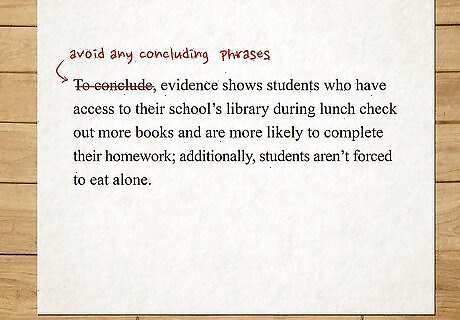
Popular concluding statements Phrases like “in conclusion,” “to conclude,” “in summary,” and “to summarize” can come across as stiff because they are used so often. Instead, use unique transition statements that match your essay's flow.
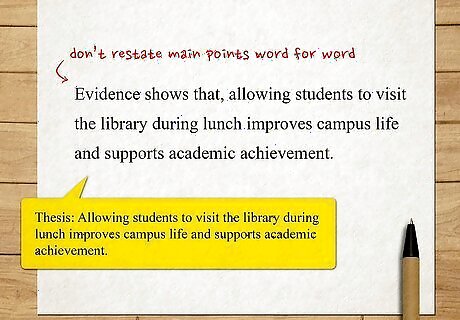
Restating main points word for word Avoid summarizing your points in your conclusion the same way they’re written in the body of your essay. Remember, readers have already read your essay. Give them something new by rewriting ideas rather than restating them.
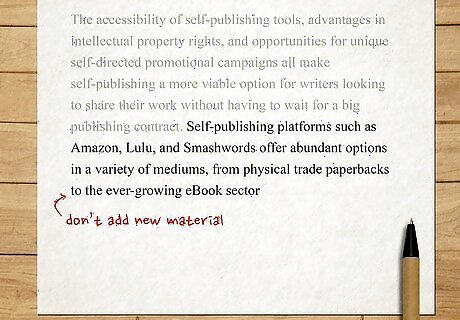
New material Keep new information or details out of the conclusion. Now is the time to sum up your thoughts, not present a new idea. Focus on your original argument or opinion, so readers won’t leave your essay wanting more.
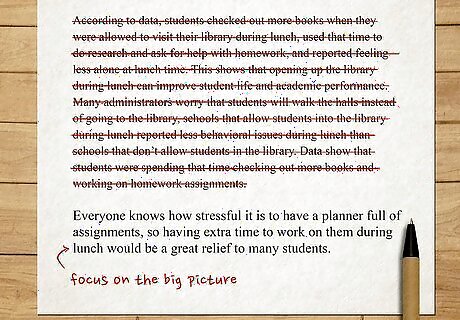
Minor points or issues The conclusion is not the time to nitpick small themes. Instead, focus on the big picture rather than highlighting every detail. What is the heart of your essay? What should readers be thinking about when they finish reading?
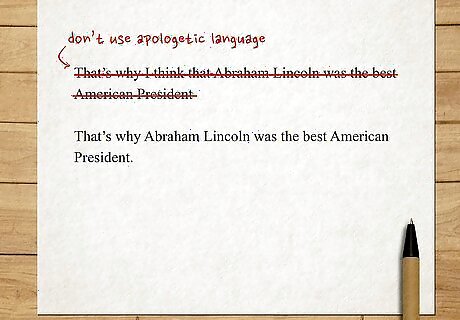
Apologetic language Unless you’re writing an informal essay, your language should be authoritative. The more professional and formal your word choice is, the more likely readers will believe your argument. Avoid apologizing for your ideas and stand firm in your beliefs. For instance, instead of writing, “That’s why I think that Abraham Lincoln was the best American President,” write, “That’s why Abraham Lincoln was the best American President.” There’s no room for ifs, ands, or buts—your opinion matters and doesn’t need to be apologized for!
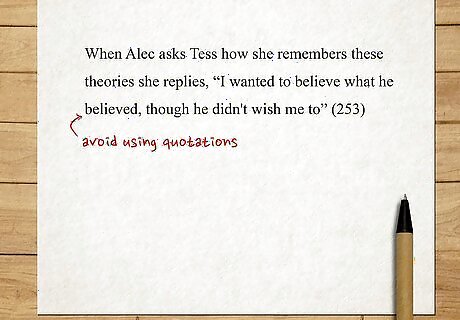
Quotations Resist the urge to quote resources in your final paragraph. Remember, the conclusion is where you tie everything together for readers, not where you introduce new information. So, avoid adding quotes unless they will be meaningful or impactful in your concluding argument.
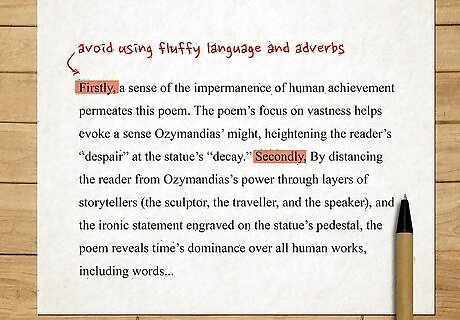
Fluffy language and adverbs Focus on keeping your conclusion short and simple. Leave the details in the body paragraphs and avoid words that end in “-ly,” as these can put doubt in your statements. All in all, do your best to make your thoughts clear and concise. For instance, words like “firstly,” “secondly,” and “thirdly” may be great transition statements for body paragraphs but are unnecessary in a conclusion.
Brainstorming Tricks
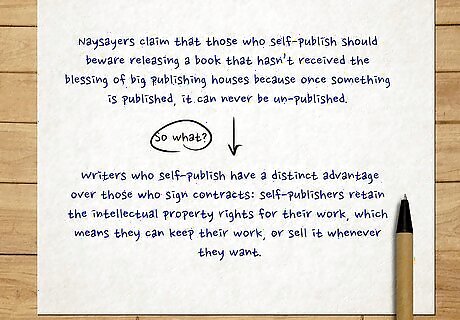
Ask yourself, “So what?” A helpful way to think about your conclusion is to imagine someone reading your essay and then asking, “So?” Why should the reader care about your argument or what you’ve written about? What can you say in your conclusion to help convince them that your opinions and ideas matter?
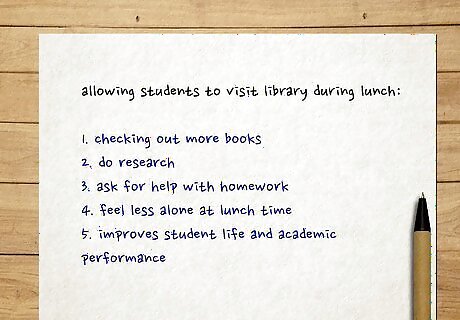
Make a list of the main ideas in your essay. If you’re stuck on what needs to go in your conclusion, make a numbered or bulleted list of the important topics you discussed in your essay. You don’t need to put every point in the conclusion, but this can help you decide what to focus on.
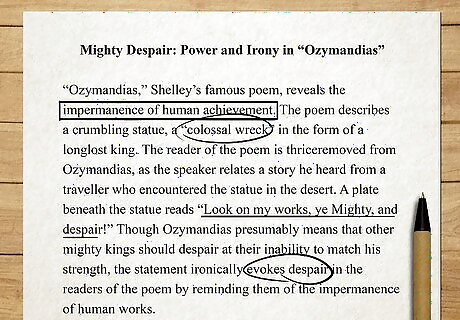
Check for themes introduced in the first paragraph. Reread your essay's introduction to get the creative juices flowing. What did you write to spark the reader’s curiosity, and can you put something similar in the conclusion? Returning to a theme from the beginning of the essay at the end can bring your ideas full circle. For instance, say you began your essay with the idea that humanity’s small sense of sense stems from space’s vast size. Try returning to this idea in the conclusion by emphasizing that as human knowledge grows, space becomes smaller.

Think about your essay’s argument in a broader “big picture” context. Try linking your argument to a different context. What can readers take away from your essay that’ll impact other parts of their lives? This is an excellent way to end an essay because it makes readers think. For example, you could extend an essay on the television show Orange is the New Black by bringing up the culture of imprisonment in America.




















Comments
0 comment